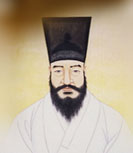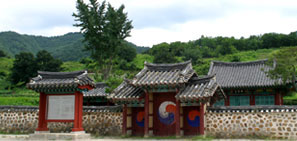
Jo Heon
(1544 ~ 1592)
Jo Heon was born in Gimpo-gun, Seogamjeong-ri on June 28, 1544 (Jungjong 39) between Jo Eung-ji (father) and Mrs. Cha (mother).
The birthplace of his first ancestor is Baekcheon, his adult name was Yeo-sik, his pen names were Jung-bong, Do-won and Hu-yul. His posthumous name was Mun-yul because of his activity as a leader of loyal troops during Japanese invasion of Korea in 1592.
In 1565 (Myeong-Jong 20), he entered Seong-Gyun-Gwan (the National University). When he was 24, he passed the civil service examination and temporarily served in the Department of the Confucian Scripture Management.
Then, he successively held various posts such as a diplomatic document reviewer and proofreader in Jungju, Paju and Hongju. While working as a reviewer in Paju, he became closely to Seong-hon and I I. Because of this, he was pointed out as a member of the west party. This had a great influence on his life. In 1572 (Seon-jo 5), when he was working as a manager in the Department of the Confucian Scripture Management, he was opposed to the king's granting incense to temples. As a result, he was removed from his office, but was reinstated soon. In 1574 (Seon-jo 7), he went to the Ming along with a formal envoy Bak Hui-lip.
In 1572 (Seon-jo 5), when he was working as a manager in the Department of the Confucian Scripture Management, he was opposed to the king's granting incense to temples. As a result, he was removed from his office, but was reinstated soon. In 1574 (Seon-jo 7), he went to the Ming along with a formal envoy Bak Hui-lip.
After several years, he became an inspector in the Department of the Treasury and the Department of Rites, Protocol, Culture and Education.
Then, he became the mayor of the small city, Tongjin. However, he was impeached for beating a criminal to death and was exiled to Bu-pyeong for 2 years. In 1581, he served as a manager in the Department of Forestry, Industry and Construction, an official in Jeolla-do and a manager at the Royal Ancestors Shrine. In 1582, he became the mayor of Boeun to support his parents. In 1586, he became a high-ranking official in Gongju. As the east party members brought a charge against I I and Seong Hon, he appealed to the king and returned his hometown, Okcheon. During Japanese invasion of Korean, he showed his mettle as a leader of a volunteer army and died a glorious death on the field of Geumsan at the age of 49. His dead body was moved to Okcheon and his funeral was held there. Thanks to the appeal by Seong Hon, the government conferred the Deputy Secretary of the Secretary rank of the Department of Personnel, Attorney General, the Director of the National Library on him. After the war, he was recognized as one of the first-class retainers.
During Japanese invasion of Korean, he showed his mettle as a leader of a volunteer army and died a glorious death on the field of Geumsan at the age of 49. His dead body was moved to Okcheon and his funeral was held there. Thanks to the appeal by Seong Hon, the government conferred the Deputy Secretary of the Secretary rank of the Department of Personnel, Attorney General, the Director of the National Library on him. After the war, he was recognized as one of the first-class retainers.
He and his father were appointed the honorary Secretary of the Department of Personnel.
His graveyard is in Okcheon-gun, Annam-myeon, Donong-ri. In 1656, a stone monument to Jo Heon was built. Cheong-eum Gim Sang-heon composed an epitaph and Dong-Chun-Dang Song Jun-gil wrote this on the monument. Memorial ceremonies for Jo Heon are held in the Pyochung temple in Okcheon, the Seonggok memorial hall in Geumsan and the Sangheon memorial hall in Boeun. And, another stone monument was built in Geumsan. He wrote the books titled and. Go Gyeong-myeong, Gim Cheon-Il, Gwak Jae-wu and Jo Heon are four loyal subjects during Japanese invasion.
In 1565 (Myeong-Jong 20), he entered Seong-Gyun-Gwan (the National University). When he was 24, he passed the civil service examination and temporarily served in the Department of the Confucian Scripture Management.
Then, he successively held various posts such as a diplomatic document reviewer and proofreader in Jungju, Paju and Hongju. While working as a reviewer in Paju, he became closely to Seong-hon and I I. Because of this, he was pointed out as a member of the west party. This had a great influence on his life.
 In 1572 (Seon-jo 5), when he was working as a manager in the Department of the Confucian Scripture Management, he was opposed to the king's granting incense to temples. As a result, he was removed from his office, but was reinstated soon. In 1574 (Seon-jo 7), he went to the Ming along with a formal envoy Bak Hui-lip.
In 1572 (Seon-jo 5), when he was working as a manager in the Department of the Confucian Scripture Management, he was opposed to the king's granting incense to temples. As a result, he was removed from his office, but was reinstated soon. In 1574 (Seon-jo 7), he went to the Ming along with a formal envoy Bak Hui-lip.After several years, he became an inspector in the Department of the Treasury and the Department of Rites, Protocol, Culture and Education.
Then, he became the mayor of the small city, Tongjin. However, he was impeached for beating a criminal to death and was exiled to Bu-pyeong for 2 years. In 1581, he served as a manager in the Department of Forestry, Industry and Construction, an official in Jeolla-do and a manager at the Royal Ancestors Shrine. In 1582, he became the mayor of Boeun to support his parents. In 1586, he became a high-ranking official in Gongju. As the east party members brought a charge against I I and Seong Hon, he appealed to the king and returned his hometown, Okcheon.
 During Japanese invasion of Korean, he showed his mettle as a leader of a volunteer army and died a glorious death on the field of Geumsan at the age of 49. His dead body was moved to Okcheon and his funeral was held there. Thanks to the appeal by Seong Hon, the government conferred the Deputy Secretary of the Secretary rank of the Department of Personnel, Attorney General, the Director of the National Library on him. After the war, he was recognized as one of the first-class retainers.
During Japanese invasion of Korean, he showed his mettle as a leader of a volunteer army and died a glorious death on the field of Geumsan at the age of 49. His dead body was moved to Okcheon and his funeral was held there. Thanks to the appeal by Seong Hon, the government conferred the Deputy Secretary of the Secretary rank of the Department of Personnel, Attorney General, the Director of the National Library on him. After the war, he was recognized as one of the first-class retainers.He and his father were appointed the honorary Secretary of the Department of Personnel.
His graveyard is in Okcheon-gun, Annam-myeon, Donong-ri. In 1656, a stone monument to Jo Heon was built. Cheong-eum Gim Sang-heon composed an epitaph and Dong-Chun-Dang Song Jun-gil wrote this on the monument. Memorial ceremonies for Jo Heon are held in the Pyochung temple in Okcheon, the Seonggok memorial hall in Geumsan and the Sangheon memorial hall in Boeun. And, another stone monument was built in Geumsan. He wrote the books titled and. Go Gyeong-myeong, Gim Cheon-Il, Gwak Jae-wu and Jo Heon are four loyal subjects during Japanese invasion.